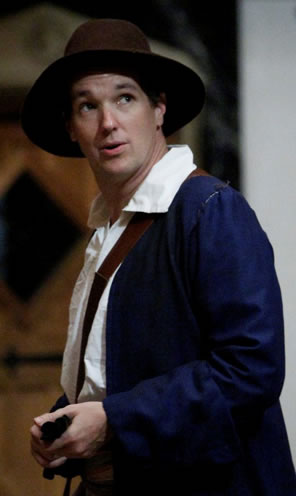Wild Oats
A Star Vehicle
By John O'Keeffe
American Shakespeare Center, Blackfriars Playhouse, Staunton, Va.
Sunday, October 10, 2010, A–5&6 (center stalls)
Directed by Jim Warren

John Harrell as Rover, the traveling actor slipping in and out of roles in Wild Oats at the Blackfriars Playhouse. Photo by Tommy Thompson, American Shakespeare Center.
Some actors were born to play certain roles. And some roles were written for certain actors—even if the play's composition and actors' births were centuries apart. Meet Rover, the lead role of this 1791 comedy, and ASC's John Harrell. The traveling actor who ends up impersonating the son he really is in order to court a beautiful Quaker woman that his chief antagonist unknowingly wants him to marry is an ideal part for Harrell's often droll deliveries, his ability to slip from stage declamation to introspective mumble in the span of a syllable, and his physical agility shifting in and out of characters. Harrell is best when he is playing the absurd.
In Wild Oats, he gets it both ways: He is both absurd and an unwitting player in absurd circumstances. Rover is an actor who can take on any role—including great Shakespearean roles—to will his way through a sequence of encounters that are, in turn, discomforting, beneficent, and dangerous. In such manner, he comes to impersonate Harry Thunder, son of a voluble knight (James Keegan) wanting to match his only heir with Lady Mary Amaranth (Sarah Fallon). This leads to a series of mistaken identities unraveled only by the real Harry Thunder (Patrick Midgley), best friend of Rover—though Rover knows him as Dick Buskin. However, the real Harry perpetuates the confusion by convincing Rover that Sir George Thunder is really an actor named Abber Wang, so he, Rover, should continue his impersonation as Harry. Among the funniest moments of the play were Rover addressing Thunder as Abber Wang and believing that Lady Amaranth, who knows both Thunders, is gulled by the other two supposed actors.
Such plot developments drive much of the play's humor. The longest sustained laugh of the day came when Sir George met the real Harry for the first time and chided him for leaving off his cracking of walnuts. Sir George was basing his criticism on a report of Rover's activities, but Midgley's Harry—who at this point didn't know Rover was involved—could only stare in long, drawn-out astonishment. Midgley also generated an ovation from the audience when he described to Rover the various levels of deception, which was itself a deception. Most of the physical comedy was turned in by the Gammon family, portrayed as a trio of Appalachian hillbillies by Benjamin Curns as Farmer Gammon, Chris Johnston as his son Sim, and understudy Emily Gibson ably filling in for Ginna Hoben as his daughter Jane.
This being ASC, the musical interludes were part of the experience, with Curns and Johnston on guitar joined by Jeremiah Davis on flute providing a western drama soundtrack during scene changes, a shtick that eventually involved strange facial expressions and choreographed movements. Then there was the moment when Gibson's Jane was looking into a mirror as the hypocritical Quaker steward Ephraim Smooth (René Thornton Jr.) sneaked up behind her: Jane screamed, Smooth screamed, and the woman sitting next to us screamed.
How wonderful that a 200-year-old play can engender such involvement from the audience, not to mention creating a lead role for an actor born almost 200 years later.
Eric Minton
October 12, 2010
Comment: e-mail editorial@shakespeareances.com
Start a discussion in the Bardroom


